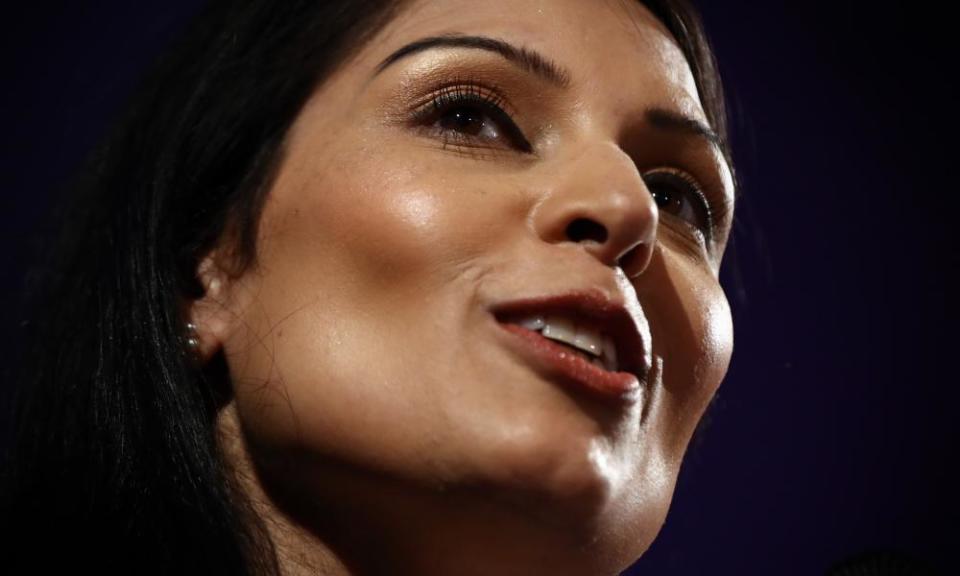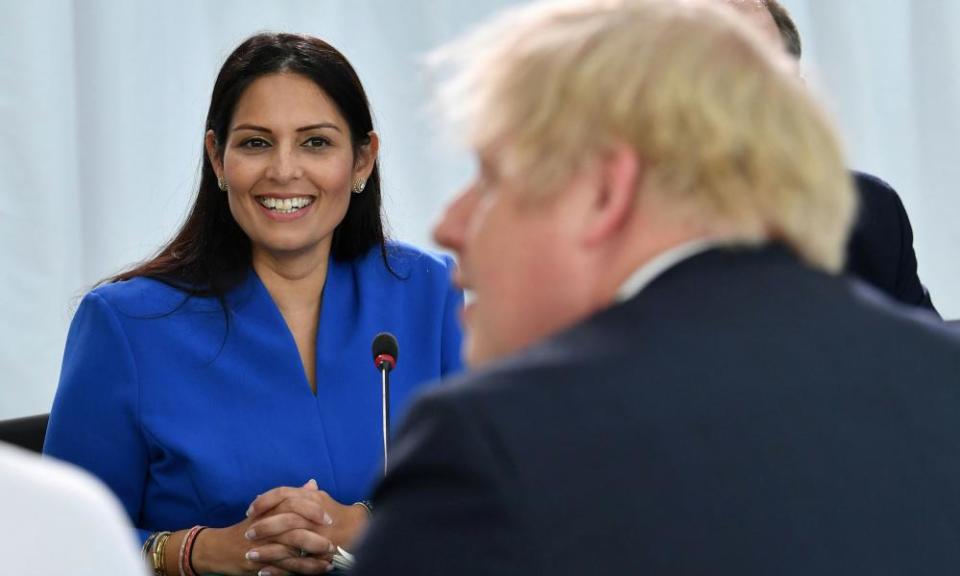Who is the real Priti Patel?

The story goes like this: when the news that Priti Patel had stepped down as international development secretary spread through her department, some civil servants burst into an impromptu singalong of Ding Dong! The Witch is Dead.
While largely told secondhand, the vignette illustrates a current political truth about Patel, that someone who not many years ago was regularly tipped as a future prime minister is now among the most divisive figures in Westminster.
It is common for there to be mixed feelings towards politicians, but views on Patel, now Boris Johnson’s home secretary, appear particularly split. Some former colleagues, even opposition MPs, speak of her as approachable, friendly and self-deprecating. But certain civil servants and officials tell a very different story.
Following a series of claims about bullying behaviour at the Home Office – vehemently rejected by Patel’s allies – several sources have made similar claims to the Guardian about when Patel was international development secretary. Her tenure in that role ended abruptly in 2017 when it emerged she had failed to tell Theresa May about meetings with Israeli politicians and officials while supposedly on holiday.
One official who witnessed Patel at the Department for International Development (DfID) said her behaviour there was “as bad as the stories say”, with staff ranging from her private ministerial office to senior civil servants having “really suffered”.
The official said: “While the word ‘bullying’ is used, with her it’s not really personal, as if she took a dislike to certain people, it was her typical manner. One minute she would come across rude or ungrateful, and another she would be being dismissive or hostile in the face of advice. It was difficult for the people who experienced it.”

Such behaviour was not universal, they said. “I doubt you’ll hear politicians saying any of this. I think she’s been careful about how she’s presented herself all these years. And she can be the most charming person, people feel drawn to her.”
The official said they had not spoken out before. “I’m not saying this because I want her to be removed from office. But the whole thing doesn’t feel right. At the end of the day, it’s not right to treat people the way she does.”
Another official familiar with Patel’s period at DfID backed this up, saying the recent allegations “did not come as a surprise, because she had a reputation for being a bully”. They added that many had been “traumatised” from her time in the department.
In contrast, one Conservative figure who worked with Patel when she was a junior minister recalled that at the time she was “mainly notorious for being very nice, friendly and happy to help”.
One constant in Patel’s political life has been her beliefs. A career-long Eurosceptic, she holds views on law and order sufficiently robust that she famously spoke in favour of the death penalty on the BBC’s Question Time in 2011, a view she now disowns.
While her position on the right of the Conservatives made her something of an outlier when she first became an MP in 2010 during the David Cameron years, it now chimes happily with Boris Johnson’s government.
The child of Gujarati Indian parents who fled to the UK from Uganda just before Idi Amin’s decision to deport all Asians, Patel shares a love of Margaret Thatcher with her father, Sushil, who built up a chain of newsagents and once stood for Ukip in council elections.
As a new MP, Patel was one of the contributors to Britannia Unchained, a 2012 book of Thatcher-on-steroids essays calling for lower taxes and massive economic deregulation, with one section famously describing Britons as “among the worst idlers in the world”.
Like her co-authors Dominic Raab and Liz Truss, Patel now has a senior cabinet job, even if, paradoxically, she finds herself in a government publicly committed to increases in public spending and maintaining EU-level standards and regulations.
Patel’s trenchant views have alarmed some critics during her ascent. When she took over at DfID, one charity even went to the trouble of compiling a cuttings dossier of her previous statements calling for the aid budget to be reduced or redistributed.
Similarly, her appointment to the Home Office prompted rights groups to raise her previous comments on areas including immigration, asylum and criminal justice – not least the death penalty.
While she is, in ministerial terms, just one step away from No 10, Patel is now rarely talked about as a future PM, despite a capacity for hard work and the ability, even acknowledged by her enemies, to be hugely charming.
One former Labour MP who worked with Patel on cross-party matters said he “disagrees with her fundamentally on pretty much everything” in politics, but nonetheless called her “nice, normal and fun”. He said: “To me she always seemed like one of those MPs who doesn’t take it all too seriously, which can be a curse in Westminster.”
The lowering of expectations for her career seems to have several causes. One is a seeming capacity for political misjudgment, notably her extracurricular visit to Israel, which baffled and outraged May and her team.
Patel’s decision to hold a dozen unauthorised work meetings during what was billed as a family holiday, including with Benjamin Netanyahu, the prime minister, seemed motivated by her vigorous opinions on foreign policy, apparently influenced by her ties to strongly pro-Israel and pro-US groups such as the Henry Jackson Society.
Most of all, weeks of allegations about bullying and fallings-out with senior civil servants, coupled with reports that she sought to have the director of communications at the Home Office removed just before Christmas, have clearly damaged Patel’s reputation, for all the counter-briefing by allies.
But at the same time, Patel’s allies are vehement her reputation is unfair. One official who worked closely with her at her Home Office said she has “the hardest job in British politics”.
They said: “Personally, I loved working for Priti. She is an extremely motivated and demanding boss, sure, but also incredibly kind. Frankly, I find the allegations of bullying ridiculous. I’ve never seen anything that even vaguely resembles it.”
Potted profile
Born: 29 March 1972 in north London.
Career: Educated at state schools, then Keele and Essex Universities. After stints as a press officer for both the Referendum party and the Conservatives, she worked in corporate PR for Weber Shandwick, and for the drinks giant Diageo. Having become an MP in 2010 she had junior ministerial roles in the Treasury and Department for Work and Pensions under David Cameron, before Theresa May made her international development secretary.
High point: Returning to the cabinet as home secretary under Boris Johnson.
Low point: Being forced to resign by May after failing to tell the PM about unofficial meetings in Israel.
She says: “As the daughter of a migrant, I know the sanctuary, welcome and opportunities that Britain provides. Regaining control of our borders does not mean slamming the door shut.”
They say: “Priti Patel is a politician with a consistent record of voting against basic human rights protections. For her to be put in charge of the Home Office is extremely concerning,” – rights group Liberty.

